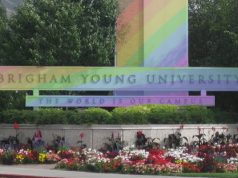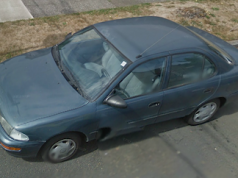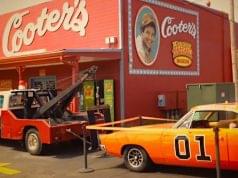If you have ever parked on campus for longer than 12 seconds, you have no doubt received a parking ticket. Parking tickets are distributed more widely than “Watchtower” magazine. If all the money raised by BYU parking tickets over the course of one day were stacked up in a huge pile, it would reach to the moon, where you would find that BYU has also made parking illegal.
One interesting thing about parking tickets is that if you get seven of them in 12 months — even if you pay them all — you will be banned from parking, or even driving, on campus, forevermore. How do I know this? The same way I know about the secret water slides under the HFAC, and probate court: personal experience.
Actually, it’s an experience that Pedro and I both had. Pedro, as you’ll recall, is my 1987 Hyundai Excel (he sends his regards). Pedro and I have recently had our parking/driving privileges revoked because of too many tickets. I blame Pedro entirely, although I really can’t back that up with anything.
I used to get tickets in a careless, slap-dash manner. For example, last winter when I lived not-all-that-close to campus, I often didn’t want to walk to class in the snow. I knew I could park in the 30-minute parking across from the Wilkinson Center, but there was a chance I’d get a ticket for being there too long. So I’d weigh my options: trudge through the snow, or maybe pay 10 bucks. When you’re as lazy as I am, decisions like that are fairly easy to make, and you make them all the time. When I first got transferred to a bike area on my mission, I paid my new companion $10 to put my bike together for me. I was perfectly capable of doing it, but I decided I would rather read a Hugh Nibley book.
I racked up several tickets that way (being lazy, not reading Hugh Nibley books), but I didn’t know how many I had until I got a registered letter from the Traffic Office, informing me that I was thereby forbidden from parking or driving on campus anymore. It also said I could appeal the decision. I figured it was worth a shot, but of course it wasn’t.
I scheduled a hearing and met with the review committee, which consisted of the following: three elderly persons. All three of them were very nice, except for two of them. First there was a man whom I call The Lecturer. It was his job to help me realize the seriousness of my crimes.
THE LECTURER: Did you ever stop to think, when you parked in faculty lots, that you were taking up a space that a professor might need? That he might be rushing to get to class on time, but he wouldn’t be able to find a spot because your car was in the way, and so his class would go untaught and soon there would be anarchy and rioting, and before you know it, we’d all be dead?
ME: I tried to only park in faculty parking when I could see that there were several spots available, so I wouldn’t be taking the last one.
THE LECTURER: Did you ever stop to think about how fast those spots can fill up?
ME: Well, I —
THE LECTURER: Did you ever stop to think about how inconsiderate you were being?
ME: I —
THE LECTURER: Did you ever stop to think about anything?!
ME: (head bowed ashamedly) I have no regard for human life.
Next we had The Lady. She was the nice one. She smiled a lot.
Then we had The Other Guy. He was blind, like Justice. This was the only time during the whole process that the concept of “justice” entered my mind.
They gave me 10 minutes to list the reasons why I should still be permitted to park on campus. I gave the following:
* As a Daily Universe editor, I may sometimes have to work late at night, and I didn’t want to have to walk home in the cold darkness of winter, where I was liable to be killed by the gangs, or the people who hang out at Denny’s. Sure, I don’t live anywhere near Denny’s, but they can’t be hanging out there ALL the time, can they?
* At least one of my tickets had been due to an honest mistake, and the only reason I paid it rather than protesting it was that I got it right before registration time, so there was a hold on my records, and I knew if I went to the trouble of fighting it, by the time I got it cleared up all my classes would be full and I’d be stuck taking classes no one wants, like American Heritage and Social Wrestling.
* Two of the tickets happened on the same day. I parked, went away, and came back a few hours later to find TWO tickets on my windshield. The officer had apparently given me one and then come back again later to give me another one, just for good measure, or perhaps because he had an extra one weighing him down, messing up the aerodynamics on his bike.
* The more I walk, the more likely I am to run into people I don’t want to talk to, like professors whose classes I didn’t go to that day. If I drive, then I’m safe.
* I’m really, really, really sorry and I’ll never park illegally again, and can’t you please have mercy on me and forgive me? I did not quote scriptures, but I could have.
They said they would consider my case, and they sent me away. A week later, I got a letter saying they were upholding the ban, and from that moment forward if I parked or drove on campus, I would be fined $300 and The Lecturer would be sent to live at my house for six months.
Realistically, I guess I can’t complain. I knew the seven-tickets-in-12-months rule, and I often didn’t take the tickets too seriously. I just don’t see the reason behind the rule, because I always paid the tickets. If the purpose of giving parking tickets is to make money, why not let people rack up as many as they can? In fact, people who get a lot of them should be given some kind of Frequent Violator Discount, where they only have to pay $15 for parking in faculty lots, instead of $20, or where they get a free toaster or something. Eventually, maybe a high-ranking administrator would present the Frequent Violator with a plaque or certificate, thanking them for contributing so much to the BYU treasury. That would encourage the scofflaws to continue scoffing at the laws, and BYU would make more money. Before you know it, they’d have enough to tear apart ALL the buildings on campus.
And if the purpose of giving parking tickets is NOT to make money — well, I can’t think of a way to end that sentence that sounds plausible.
The irony of all this is that just after the final decision was made, I was sitting in my car — the car banned from campus — for four hours each night, guarding the cougar statue outside Cougar Stadium against over-zealous, paint-wielding U. of U. fans.
See, my friend wants to be a cop when he grows up, so BYU Police called to see if he wanted to help watch campus every night the week before the big BYU/U. of U. football game. Apparently, our stuff is always getting vandalized by those coffee-swilling apostates to the north, and we weren’t going to take it anymore.
In particular, the Utes are fond of dumping red paint on the cougar, which they did — this is true — the one night my friend and I weren’t on surveillance. For the remaining nights that week, from 10 p.m. to 2 a.m., my friend and I sat in Pedro, for free, and watched the cougar. If there was any suspicious activity, we called police dispatch on the radio and alerted them. Also, we called police dispatch on the radio if we wanted more hot chocolate and/or donuts, which they would send out in a jiffy, sirens a-blarin’. Sergeant Richard Decker, of BYU Police, seemed quite appreciative of our efforts; I think we were the only volunteers insane enough to do surveillance every night.
And to think I did it despite having been told I could never park or drive on campus again! To think I parked on campus every night, taking a tremendous risk of being fined $300, just to lend a helping hand and get a little free hot chocolate. I don’t wish to brag about the amount of school spirit I have, but I have school spirit practically coming out of my ears. It’s really unsightly, and I’d drive to the McDonald Health Center to have it checked out, but, well, you know.




